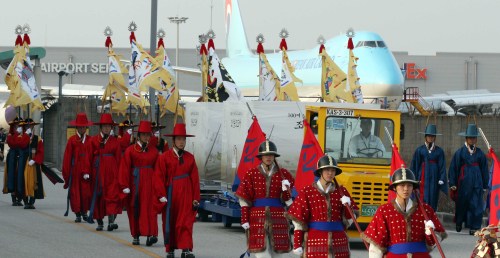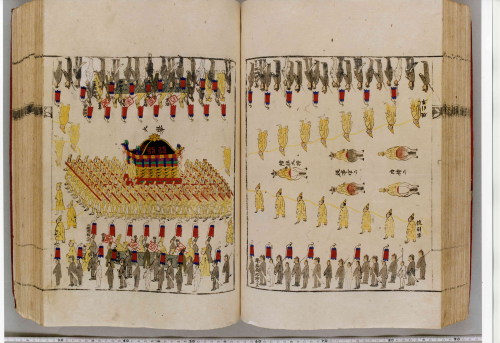
Nearly 1,200 documents taken by Japan during colonial period arrive in Seoul
Korea celebrated the return of nearly 1,200 ancient documents looted by the Japanese during its 1910-1945 colonial rule, with welcoming ceremonies at Incheon International Airport on Tuesday.
The books, including some 150 copies of Uigwe ― Joseon’s royal texts ― arrived in Seoul on Tuesday afternoon, on two separate Korean Air flights. Each aircraft carried about 600 copies.
Members of the Cultural Heritage Administration, as well as the Ministry of Foreign Affairs and Trade attended the ceremony at Gate 6 of the airport’s freight terminal.
The books were welcomed by a group of 90 performers, consisting of members of Korea’s traditional instrument orchestra and the traditional honor guard drill team.
After the ceremony, the documents were brought to the National Palace Museum of Korea in Seoul, where they will be exhibited to the public from Dec. 27 to Jan. 12.
The Cultural Heritage Administration said it is planning to hold another welcoming ceremony next Tuesday, at Jongmyo in Seoul. Another set of celebrations may take place at Odaesan in Gangwon Province, where the books were originally stored before the Japanese took them, they said.
The return of the books came nearly a year after Tokyo’s agreement to do so to improve relations.
In October, Japan’s Prime Minister Yoshihiko Noda returned five copies of Uigwe during his visit to Seoul, ahead of Tuesday’s complete return of all the books. The copies Noda brought were historically significant, as they chronicled the royal rituals of King Gojong and King Sunjong, the last two emperors of the Joseon Dynasty and Daehan Empire before Korea was annexed in 1910.
Korea celebrated the return of nearly 1,200 ancient documents looted by the Japanese during its 1910-1945 colonial rule, with welcoming ceremonies at Incheon International Airport on Tuesday.
The books, including some 150 copies of Uigwe ― Joseon’s royal texts ― arrived in Seoul on Tuesday afternoon, on two separate Korean Air flights. Each aircraft carried about 600 copies.
Members of the Cultural Heritage Administration, as well as the Ministry of Foreign Affairs and Trade attended the ceremony at Gate 6 of the airport’s freight terminal.
The books were welcomed by a group of 90 performers, consisting of members of Korea’s traditional instrument orchestra and the traditional honor guard drill team.
After the ceremony, the documents were brought to the National Palace Museum of Korea in Seoul, where they will be exhibited to the public from Dec. 27 to Jan. 12.
The Cultural Heritage Administration said it is planning to hold another welcoming ceremony next Tuesday, at Jongmyo in Seoul. Another set of celebrations may take place at Odaesan in Gangwon Province, where the books were originally stored before the Japanese took them, they said.
The return of the books came nearly a year after Tokyo’s agreement to do so to improve relations.
In October, Japan’s Prime Minister Yoshihiko Noda returned five copies of Uigwe during his visit to Seoul, ahead of Tuesday’s complete return of all the books. The copies Noda brought were historically significant, as they chronicled the royal rituals of King Gojong and King Sunjong, the last two emperors of the Joseon Dynasty and Daehan Empire before Korea was annexed in 1910.

According to Korea’s Cultural Heritage Administration, 167 Uigwe books ― along with some 1,000 other relics ― stored at the royal Gyujanggak Library in Seoul and a Buddhist temple on Odaesan in Gangwon Province ― were taken by the Japanese.
Japan’s Governor-General’s Office in Korea, under the supervision of then Resident-General Hirobumi Ito, took the books to Tokyo in 1922. The books had been stored at the Imperial Household Agency ever since.
It was not known that the royal books were stored at the Imperial Household Agency in Japan until early 2001. Volumes of Uigwe therefore weren’t included in the list of cultural artifacts to be returned to Korea from Japan compiled in 1965, when the two countries signed a treaty on basic relations which normalized diplomatic ties.
At the time, Tokyo officially returned 1,432 cultural artifacts out of the 4,479 requested.
Ven. Hyemun, a Buddhist monk who has been working toward the return of the books with a Buddhist federation in North Korea and other NGOs since 2006, said Tuesday’s return was meaningful because it was the result of the joint efforts between the two Koreas.
“After South Korea established its diplomatic ties with Japan in 1965, it lost its right to request the looted relics,” he said during a phone interview with The Korea Herald.
“But North Korea has the right, because it does not have diplomatic ties with Japan. My Buddhist group in South Korea and the one in the North jointly sent a formal letter of request (calling for the return of the books) to Japan’s Foreign Ministry in 2008. I think it had the most impact throughout the whole process.”
Upon the approval of the South Korean government, Ven. Hyemun visited North Korea about 20 times from 2007 to 2010, while trying to repatriate the royal documents. He has visited Japan more than 40 times in the past five years.
The day before the books’ arrival, an official of the Foreign Ministry recognized the contribution of many NGOs and Ven. Hyemun for their contribution to the return of the texts from Japan, while defending the Seoul government for not “being involved enough” for the return in the past.
“There have been many remarks that the government should have been more active (calling for the return of the books),” he said.
“Yet if the government gets involved, the individual owners tend to hide. To make the (future return of looted relics) more effective, we should carefully think about ways to approach the owners.”
To this, Ven. Hyemun replied cynically. “It explains why NGOs had to get involved in this project,” he said.
In July of last year, the National Institute of Korea concluded that over 60,000 missing Korean cultural assets are currently held by 250 organizations and individuals in Japan.
Unlike the Uigwe books that were returned from France in May, which are currently housed at the National Museum of Korea on a permanent lease, the ones from Japan will be designated as national cultural heritage first before being permanently stored. The Cultural Heritage Administration has not yet decided where to place the texts.
“After the exhibition is over at the National Palace Museum of Korea, the books will be carefully examined by the Cultural Properties Committee,” said an official of Cultural Heritage Administration.
“Because the books from France are in Korea on a lease, we could not designate them as national heritage, and the books did not go through the screening process by the Cultural Properties Committee. We’ll decide where to store these books after the designation process is over. Nothing really has been decided yet.”
The returning Uigwe books display both text and hand-drawn illustrations of significant rites and ceremonies of the royal family of Joseon, including weddings, funerals, banquets and the receiving of foreign missions.
Their visual-oriented content, as well as rare chronicling of the culture of Korea’s aristocracy led them to be included on the UNESCO Memory of the World list in 2007.
By Claire Lee (dyc@heraldcorp.com)
-
Articles by Korea Herald



![[Exclusive] Korean military set to ban iPhones over 'security' concerns](http://res.heraldm.com/phpwas/restmb_idxmake.php?idx=644&simg=/content/image/2024/04/23/20240423050599_0.jpg&u=20240423183955)




![[Pressure points] Leggings in public: Fashion statement or social faux pas?](http://res.heraldm.com/phpwas/restmb_idxmake.php?idx=644&simg=/content/image/2024/04/23/20240423050669_0.jpg&u=)



![[Herald Interview] 'Amid aging population, Korea to invite more young professionals from overseas'](http://res.heraldm.com/phpwas/restmb_idxmake.php?idx=644&simg=/content/image/2024/04/24/20240424050844_0.jpg&u=20240424200058)







